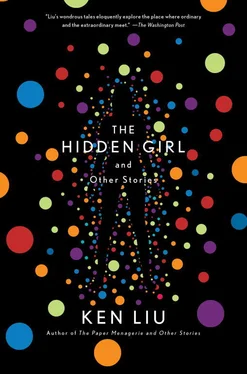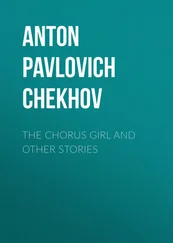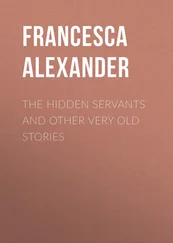Why does everyone in Hong Kong have to shout? It’s the first decade of the twentieth century, and everyone still acts like they live in villages.
“It’s William ,” William muttered. Even though his father had paid for his expensive education in England, the old man still refused to use his English name, the name he had gone by for more than a decade.
William tried to focus on the book in front of him, the words of the fourteenth-century Christian mystic:
For thou hast brought me with thi question into that same derknes, and into that same cloude of unknowyng that I wolde thou were in thiself.
“Jyu-zung!”
He plugged up his ears with his fingers.
For of alle other creatures and theire werkes—ye, and of the werkes of God self—may a man thorou grace have fulheed of knowing, and wel to kon thinke on hem; bot of God Himself can no man thinke.
The book, The Cloude of Unknowyng , had been a parting gift from Virginia, who was surely the most radiant of His works and one William longed to have “fulheed of knowing.”
“Now that you’re going back to the mysterious Orient,” she had said as she handed him the book, “may you be guided by the mystics of the Occident.”
“Hong Kong is not like that,” he had said, unhappy that she seemed to think of him as a mere Chinaman , though… he kind of was. “It’s part of the Empire. It’s civilized.” He took the book from her, almost, but not quite, touching her fingers. “I’ll be back in a year.”
She had rewarded him with a bold and radiant smile, which, more than all his high marks and the praise from his tutors, made him feel like a proper Englishman.
And therfore I wole leve al that thing that I can think, and chese to my love that thing that I cannot think. For whi He may wel be loved, bot not thought. By love may He be getyn and holden; bot bi thought neither.
“Jyu-zung! What is the matter with you?”
His father stood in the door, his face red with the exertion of having climbed up the ladder to William’s attic room.
William pulled his fingers from his ears.
“You’re supposed to help me with the preparations for Yu Lan .”
After the mellifluous music of Middle English in his head, his father’s Cantonese grated on his ears like the clanging of cymbals and gongs in Jyut kek , the native “folk opera” that was undeserving of the name, a barbarous shadow of the real operas he had attended in London.
“I’m busy,” William said.
His father looked from his face to his book and then back again.
“It’s an important book,” he said, avoiding his father’s gaze.
“The ghosts will be parading tonight.” His father shuffled his feet. “Let’s make sure the spirits of our ancestors aren’t ashamed, and we can try to comfort the homeless ghosts.”
To go from reading Darwin, Newton, and Smith to this , to appeasing ghosts . In England, men were contemplating the possibility of knowing all the laws of nature, the end of science, but here, under his father’s roof, it was still the Middle Ages. He could easily imagine the look on Virginia’s face.
He had nothing in common with his father, who might as well be an alien.
“I’m not asking,” his father said. His voice grew hard, like the way the Cantonese opera actors ended a scene.
Rationality suffocates in the air of superstition in the colonies. His determination to go back to England had never been stronger.
•
“Why would Grandfather need this?” William asked, staring critically at the paper model of an Arrol-Johnston three-cylinder horseless carriage.
“Everyone appreciates things that make life more comfortable,” his father said.
William shook his head but continued the task of gluing headlights made of yellow paper—intended to simulate brass—to the model.
Next to him, the surface of the table was covered with other offerings to be burnt later that night: a paper model of a Western-style cottage, paper suits, paper dress shoes, stacks of “underworld money” and piles of “gold bullion.”
He could not resist commenting, “Grandfather and Great-grandfather must have poor eyesight to confuse these with the real thing.”
His father refused to take the bait, and they continued to work in silence.
To make the tedious ritual tolerable, William fantasized that he was polishing the car in preparation for a ride through the countryside with Virginia….
“Jyu-zung, could you take out the sandalwood table from the basement? Let’s lay out the feast for the ghosts with some style. We shouldn’t argue anymore on this day.”
The pleading note in his father’s voice surprised William. He noticed, suddenly, how bent his father’s back had become.
An image came unbidden to him of himself as a young boy sitting on top of his father’s shoulders, which had seemed as broad and steady as a mountain.
“Higher, higher!” he shouted.
And his father lifted him over his head so that he could be above the milling crowd, so that he could see the exciting costumes and beautiful makeup of the folk opera troupe performing for Yu Lan.
His father’s arms were so strong and kept him lifted high in the air for a long time.
“Of course, Aa-baa ,” William said, and stood up to go to the warehouse in the back.
The warehouse was dark, dry, and cool. This was where his father temporarily stored the antiques he was restoring for customers as well as the pieces he collected. The heavy wooden shelves and cubbyholes were filled with Zhou bronze ritual vessels, Han jade carvings, Tang tomb figurines, Ming porcelain, and all manner of other wares that William did not recognize.
He made his way carefully through the narrow hallways, looking impatiently for his prize.
Maybe in that corner?
In this corner of the warehouse, a ray of slanting light from a papered-over window illuminated a small workbench. Behind it, leaning against the wall, was the sandalwood dining table.
As he bent down to pick up the table, what he saw on the workbench stopped him.
There were two identical-looking bubi , ancient bronze coins, on the table. They looked like palm-size spades. Though he didn’t know much about antiques, he had seen enough bubi as a child to know that this style was from the Zhou Dynasty or earlier. The ancient Chinese kings had cast coins in this shape to show a reverence for the earth, from which came life-sustaining crops and to which all life must return. Digging in the earth was a promise to the future as well as an acknowledgment of the past.
Given how large these bubi were, William knew they must be valuable. To have an identical pair was very rare.
Curious, he looked closer at the coins, which were covered in a dark green patina. Something didn’t seem right. He flipped over the one on the left: it gleamed bright yellow, almost like gold.
Next to the coins was a small dish with some dark blue powder inside, and a paintbrush. William sniffed the powder: coppery.
He knew that bronze only looked bright yellow if it was freshly cast.
He tried to push away the thought. His father had always been an honorable man who made an honest living. It was unfilial for a son to think such thoughts.
But he picked up the pair of bubi and put them in his pocket. His English teachers had taught him to ask questions, to dig for the truth, no matter what the consequences.
He half-dragged and half-carried the table up to the front hall.
•
“Now this looks like a proper festival,” his father said as he placed the last plate of vegetarian duck on the table. The table was filled with plates of fruit and mock-versions of every kind of meat. Eight place settings had been arranged around the table, ready to receive the ghosts of the ancestors of the Ho family.
Читать дальше












